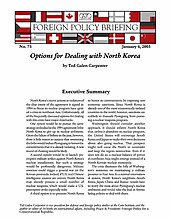One option would be to pursue the same strategy embodied in the 1994 agreement: bribe North Korea to give up its nuclear ambitions. Given the failure of bribery in the past, however, there is little reason to assume that sweetening the bribe would induce Pyongyang to honor the commitments that it is already violating. A new round of cheating would be likely.
A second option would be to launch preemptive military strikes against North Korea’s nuclear installations. But such a strategy would be profoundly dangerous. Military coercion could trigger a general war on the Korean peninsula. Indeed, if U.S. and Chinese intelligence sources are correct, North Korea may already possess a small number of nuclear weapons, which would make a U.S. preemptive strike especially risky.
A third option is to pressure North Korea to honor its commitments by imposing new economic sanctions. Since North Korea is already one of the most economically isolated countries in the world, however, sanctions are unlikely to dissuade Pyongyang from pursuing a nuclear weapons program.
Washington should consider another approach. It should inform North Korea that, unless it abandons its nuclear program, the United States will encourage South Korea and Japan to make their own decisions about also going nuclear. That prospect might well cause the North to reconsider and keep the region nonnuclear. Even if it does not do so, a nuclear balance of power in northeast Asia might emerge instead of a North Korean nuclear monopoly.
The crisis illustrates the folly of Washington’s insistence on maintaining a military presence in East Asia. In a normal international system, North Korea’s neighbors–South Korea, Japan, China, and Russia–would have to worry the most about Pyongyang’s nuclear ambitions and would take the lead in formulating policies to deal with them.


